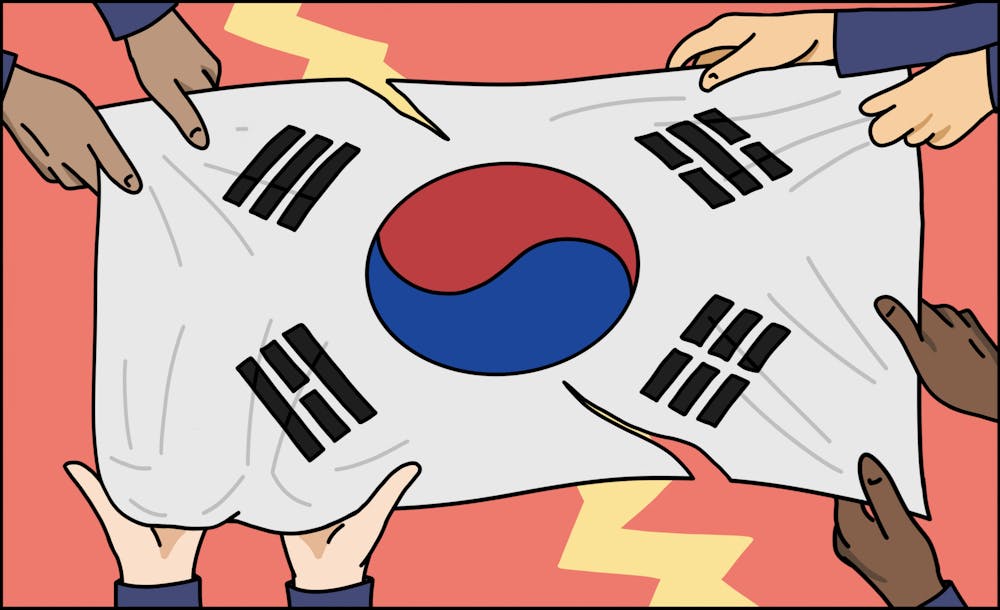Instability and insurrection in South Korea have sent shockwaves through its economy and sparked resistance across the country, with Korean students at Emory University feeling the impacts.
Former South Korean president Yoon Suk Yeol was in court on Feb. 4 for his impeachment trial, two months after he declared martial law to defend the nation from “anti-state” forces that are sympathetic to North Korea. The act was met with resistance from both the public and lawmakers alike.
Korean Undergraduate Student Association Freshman Representative Cindy Lee (28C) said that she was taken aback by the news.
“Martial law in a democratic republic, in modern day, is crazy,” Cindy Lee said.
Less than two hours after martial law was imposed, the national assembly lifted it through a unanimous vote. The opposition party soon made motions to impeach the president, the second of which succeeded on Dec. 14, 2024.
Jay Lee (26Ox), an international student from Busan, South Korea, said the political tension has damaged South Korea’s international image.
“It was supposed to be one of the best democratic countries in the world, but then this martial law thing happened, and that got people questioning the democracy in Korea,” Jay Lee said.
Immediately following the law’s announcement, thousands of angry South Koreans flooded the streets of Seoul, South Korea in protest. People gathered in front of the National Assembly Building demanding Yoon’s impeachment, facing off against the police and guarding the building.
Cindy Lee also stated she felt deeply moved by the active roles young women have played throughout this crisis and has faith in the younger generations to continue defending a democratic Korea despite anxiety about the nation’s future.
“I’ve actually heard a couple of my Emory friends talking about being … nervous about holding Korean nationality,” Cindy Lee said.
Cindy Lee discussed this fear in the context of South Korea’s long history with military dictatorships. She explained that the country struggled against a dictatorial government until a democratic uprising caused democratic consolidation in 1987.
“Even though Korea is a democratic country, it hasn’t been very long since we actually became democratic in a true sense,” Cindy Lee said.
The political turmoil has also damaged South Korea’s economy, with major stocks and the South Korean won plummeting to the lowest levels in years.
Jay Lee expressed his frustration about the won’s depreciation. Lee explained that as a result of the won’s plummeting value, his family decided to postpone making a large purchase until the currency strengthened.
“My parents told me to never save on food, but they did tell me to try to save money in general because the Korean won is just so cheap right now,” Jay Lee said.
Reflecting on recent evolutions in South Korean politics, Fulbright Korea Distinguished Chair Suk Koo Rhee highlighted the differences between Yoon’s impeachment with former South Korean President Park Geun Hye’s impeachment in 2016, which both involved bribery cases and sparked widespread public uproar.
“The cause of Park Geun Hye’s impeachment, the reason was that she allowed her confidants to influence the affairs of the state. You are not supposed to allow your friends to [influence the state] without official titles, right?” Rhee said. “But this time it’s much graver than that because the president imposed a martial law when there were no grounds for declaring a martial law.”
Rhee explained that martial law can only be declared when the state’s security is under threat. He said that bribery scandals involving Yoon’s wife, South Korean First Lady Kim Keon-hee, and Yoon’s declaration of martial law to avoid investigations and nominate legislative candidates also contributed to his downfall. However, recent polls have shown that support for Yoon has grown from 33 to 36%, while support for his impeachment has fallen from 62 to 59%, despite his crimes.
“The majority of people want to see the president fired,” Rhee said. “But much less people want to see a regime change,” Rhee said.
He explained that this is due to the even less popular opposition party leader, Lee Jae-myung. Lee is also involved in cases of corruption and is known for using unjust tactics to attack opponents within his party, resulting in dwindling support.
In addition to the political turmoil, Rhee said the looming threat of U.S. President Donald Trump’s tariffs has further harmed South Korea’s already-struggling economy.
“The country is in chaos,” Rhee said. “We’re trying to survive now. It’s a matter of survival.”
Rhee expressed his faith in the people to restore democracy, even during these times of instability.
“If the people want it, they will have it back,” Rhee said. “It is just a matter of time. History progresses, it may take a few steps back, but it will eventually make more progress.”










